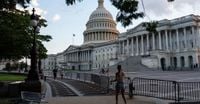On July 2, 2025, the U.S. Senate passed a sweeping tax and budget bill that extends key provisions of the 2017 Tax Cuts and Jobs Act (TCJA) while introducing dozens of new measures. The legislation, championed by Senate Republicans, aims to solidify tax cuts, reform energy credits, and reshape business deductions, but it also faces fierce criticism for its costly spending and potential social safety net rollbacks.
The Senate bill closely follows similar legislation passed by House Republicans, collectively dubbed the "One, Big, Beautiful Bill." Advocates highlight several permanent tax provisions designed to stimulate economic growth. Notably, the bill makes permanent the House's allowance for expensing investments in short-lived assets and domestic research and development, which economists estimate could boost long-run GDP by 0.7 percent by providing certainty to investors. The Senate also retains temporary expensing for qualified structures and extends TCJA's more lenient interest deduction limits.
Small businesses receive a boost through a permanently higher threshold for Section 179 expensing, allowing them to deduct equipment costs more readily. Both chambers have secured permanent extension of the 2017 individual tax rates and brackets, along with a larger standard deduction and a modified alternative minimum tax (AMT) threshold, simplifying tax filing for millions. Itemized deduction limits, such as those on mortgage interest and state and local taxes (SALT), remain in place but with some adjustments.
The SALT deduction cap, a contentious issue, sees a notable difference between the chambers. The Senate bill raises the cap to $40,000 (adjusted annually by 1 percent) for taxpayers earning under $500,000 from 2025 through 2029, before reverting to the $10,000 cap permanently. The House bill makes this $40,000 cap permanent, a move critics say favors higher earners.
On estate and gift taxes, both bills institute a permanent, inflation-adjusted exemption level of $15 million starting in 2026. International business tax provisions are also addressed, with the Senate introducing permanent reforms that increase tax rates but reduce double taxation, contrasting with the House's slightly less generous extension of current policies.
However, the bills also raise about $500 billion over a decade by scaling back the Inflation Reduction Act's (IRA) green energy tax credits, including repealing credits for electric vehicles and residential energy products and phasing out others more rapidly. The Senate bill notably expands the carbon oxide sequestration credit and extends the clean fuel production tax credit, though these come with added compliance challenges.
Health insurance premium tax credits, projected to cost roughly $1 trillion over ten years, are trimmed by about 20 percent through stricter eligibility rules and efforts to reduce improper payments. Tax-exempt rules face tightening, especially concerning unrelated business income.
Yet, the legislation is not without its detractors. Critics argue that the bills waste billions on political gimmicks and carveouts, such as tax exemptions for overtime pay and tips, deductions for auto loan interest, and additional standard deductions for some seniors. These four provisions alone are projected to cost over $350 billion in just four years under the Senate version, with costs potentially doubling if made permanent.
A significant concern lies with the treatment of non-corporate, or "pass-through," businesses. The 20 percent deduction on business income taxed at individual rates is made permanent in the Senate bill and increased to 23 percent in the House version. The House's expansion could cost upwards of $700 billion over a decade, while the Senate's version is estimated at $655 billion. Such provisions further skew the tax code's neutrality between business forms.
Financially, the Senate bill is pricier than its House counterpart, reducing revenue by $5 trillion on a conventional basis and $4 trillion dynamically, compared to $4 trillion and $3.1 trillion respectively for the House bill. Even after considering spending changes, the Senate legislation would increase the deficit by nearly $2.9 trillion over ten years, dwarfing the House's $1.7 trillion increase.
Beyond fiscal concerns, the bills complicate the tax code with new rules that could burden taxpayers. For example, exemptions for tips, overtime, and car loans come with complex eligibility criteria that will likely require extensive IRS guidance. The IRA credit changes maintain some of the most complicated provisions, including bonus credits tied to prevailing wage and apprenticeship requirements, and introduce new restrictions that may limit credit use.
The bills also introduce "Trump Accounts," a new savings vehicle offering a $1,000 government-provided baby bonus for children born in the next four years. Taxpayers can contribute up to $5,000 annually, with tax-free growth until withdrawal at age 18 or older, though withdrawals may be subject to capital gains tax or penalties depending on use. Critics argue these accounts add complexity without simplifying saving options, especially given existing tax-preferred accounts for education, health, and retirement.
Complementing Trump Accounts, the legislation establishes a tax credit for donations to scholarship-granting organizations. The Senate makes this credit permanent but reduces it to $1,700, down from the House's higher amount. This measure, while beneficial to some, is expected to require significant administrative effort from the Treasury and IRS.
Meanwhile, health care and social safety net programs face severe cuts. On the same day the Senate passed the tax bill, Republicans also passed a budget bill that would slash Medicaid, Medicare, and Supplemental Nutrition Assistance Program (SNAP) benefits to fund these tax cuts. The Congressional Budget Office (CBO) projects that 17 million Americans could lose health coverage under the budget bill.
The Medicaid cuts include imposing work reporting requirements, increasing enrollee cost-sharing, restricting eligibility, and eliminating access for many lawfully present immigrants. Medicare would be undermined by stripping coverage from current enrollees, halting nursing home safety rules, and reducing access to Medicare Savings Programs and Part D Low-Income Subsidy, which help make care and prescriptions affordable for low-income beneficiaries.
Tax credits supporting Affordable Care Act (ACA) marketplace plans would be eliminated, threatening coverage for over 22 million people and resulting in nearly 5 million adults aged 50 to 64 facing higher premiums. An estimated 8 million people losing ACA coverage would remain uninsured. SNAP benefits would be slashed by increasing administrative hurdles and shifting costs to states, risking food security for millions.
The CBO estimates that nearly 1.4 million low-income Medicare beneficiaries would lose Medicare Savings Program coverage, resulting in increased out-of-pocket costs. Without these programs, beneficiaries could lose at least $185 per month initially, with costs projected to rise sharply over time. The budget bill would also repeal the Nursing Home Minimum Staffing Rule, endangering vulnerable populations.
These cuts are expected to have ripple effects, including destabilizing hospitals and providers, especially in rural areas, leading to job losses and economic downturns. The CBO projects that Medicaid and SNAP cuts would cost states $154 billion in 2029, more than the federal savings, resulting in 1.22 million job losses and a $12 billion drop in state and local tax revenues.
Research warns that these policies could cause more preventable deaths—estimated at over 51,000 annually—due to reduced access to care and increased financial burdens. Vulnerable groups such as older adults, people with disabilities, and children would be hardest hit.
Political tensions are high as the House of Representatives wrestles with the legislation. On July 2, 2025, the House held a protracted procedural vote to advance President Trump’s domestic policy bill, facing resistance from a faction of Republicans concerned about the bill’s cost and cuts to social programs. The procedural measure passed narrowly, 220-212 along party lines, after more than seven hours of voting and negotiations.
Notable Republicans, including Representative Thomas Massie of Kentucky, switched their votes to oppose bringing the bill to the floor, citing concerns about the deficit and policy content. Five Republicans defied party leadership, with others on the fence. Speaker Mike Johnson kept the vote open to accommodate holdouts and engaged in ongoing discussions to secure support.
President Trump expressed frustration on his social media platform, Truth Social, urging Republicans to act swiftly and warning that delays were costing votes. Meanwhile, some Republicans, such as Representative David Valadao of California, voted to advance the bill despite previous reservations about Medicaid cuts affecting their constituents.
The bill includes contentious provisions stripped from the Senate version, such as a ban on Medicaid coverage for gender-affirming care and restrictions on Trump Accounts to only U.S. citizen children. The Senate also added over $1 trillion in spending, including $50 billion for rural hospitals to offset Medicaid cuts and provisions allowing continued clean energy tax credits for projects started within a year.
Democrats uniformly oppose the legislation, framing it as a "moral failure" that undermines health care and nutrition assistance for low-income Americans while enriching the wealthy. House Democratic leader Hakeem Jeffries vowed unanimous opposition, and Democrats are leveraging the debate to highlight potential losses to constituents’ coverage and benefits.
As the House moves toward a final vote, the path remains uncertain. Alterations to the Senate-passed bill could trigger prolonged negotiations or a conference committee, potentially delaying or derailing the legislation. The July 4 deadline set by President Trump looms, adding urgency to the political maneuvering.
In this high-stakes environment, the legislation embodies deep divisions over fiscal priorities, social safety nets, and tax policy, with significant consequences for millions of Americans’ health, economic security, and the nation’s fiscal future.





